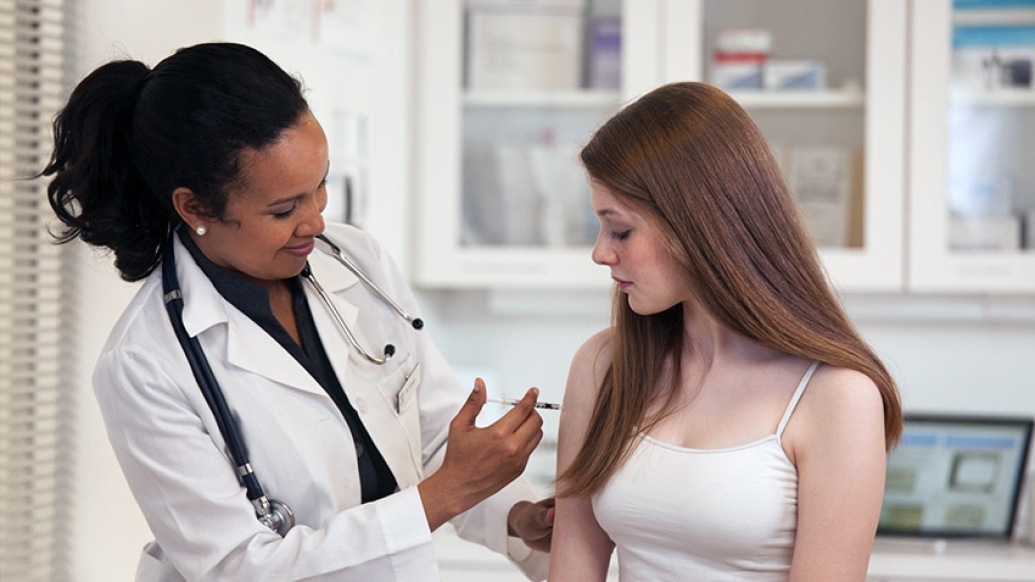The nation’s top cancer organizations have issued a statement urging increased HPV vaccination and screening to reduce cervical cancer. Here’s what you need to know.
7:00 AM
Author |

A two-step process can prevent cervical cancer and reduce the likelihood of several other HPV-associated cancers as well.
ASK ALEXA: Add the Michigan Medicine News Break to your Flash Briefing
Step 1: Get screened.
Step 2: Get vaccinated.
"Screening detects early changes before cervical cancer can develop, and the HPV vaccine helps keep your screen results normal," says Diane Harper, M.D., MPH, M.S., physician director for community outreach and engagement at the University of Michigan Rogel Cancer Center.
She and her peers want to share that message. This week, all 70 National Cancer Institute-designated cancer centers, along with a half-dozen cancer advocacy groups, issued a joint statement urging increased HPV vaccination and screening for HPV-related cancers, especially cervical cancer.
Cervical cancer affects 7 of 100,000 women in the United States — a modest rate compared to many cancers but still significant. About 13,250 American women will be diagnosed with cervical cancer this year, and 4,100 will die from it.
Prevention efforts pay off
Combined with regular screens for cervical cancer, the HPV vaccine may lower the incidence even more.
HPV, or human papillomavirus, is a sexually transmitted infection that is spread by skin-to-skin contact. HPV infection causes almost all cervical cancers. It is also a major contributor to other genital cancers, anal cancer, and head and neck cancer.
MORE FROM MICHIGAN: Sign up for our weekly newsletter
HPV vaccines were introduced in 2006, but uptake has been modest. About half of girls and 38 percent of boys have completed the series of three HPV vaccine shots.
"I strongly believe in cervical cancer prevention and the effects of the HPV vaccine," Harper says. "The vaccines will give you a higher chance of a normal screening."
But, she points out, screening is what provides the bulk of prevention over a woman's lifetime.
Which is why Harper tells her patients that the best gift they can give their daughter for her 21st birthday is an introduction to the concept that cervical cancer screening prevents cancer. The test can detect early changes in the cervix before cancer develops, when it's easier to treat.
When the Pap test was introduced, cervical cancer affected 50 of 100,000 women annually; over the past 70 years, rates of cervical cancer have dropped sevenfold.
Recommended screening and vaccine guidelines
Cervical cancer screening with a Pap test is recommended to begin at age 21 and recur every three years if no abnormalities are found. At 30, women can be screened every five years if no abnormalities are found.
The HPV vaccine is offered for girls and boys. The CDC recommends completing the vaccine series between ages 9 and 13; two or three doses are needed, depending on a child's age. Harper notes that the doses can be spaced a year apart at this age, making it easier to complete the two or three necessary doses.
Those who miss the early window, though, can still get covered. The vaccine is approved for men and women up to age 26. After age 13, all three doses should be administered within six months.
Because HPV is sexually passed back and forth, boys and girls could both get vaccinated.
Potential for greater impact
"This vaccine provides important protection for some people," says Harper, who was involved in much of the research on HPV vaccines over the past 15 years. But she notes that there are more opportunities to have an impact.
SEE ALSO: Don't Neglect Routine Pap Tests, Woman Urges Others
While cervical cancer most often occurs in women ages 35 to 44, there is another uptick of diagnoses in women over age 65. Many 40- to 50-year-old women are going through divorce and engaging in sexual activity with new partners, Harper notes.
"The #MeToo movement highlights that sexual activity occurs between males and females of all ages, willingly and unwillingly," she says. "The HPV vaccines can potentially protect these women as well, even though it will be an off-label use for this age."
Meanwhile, researchers are looking at ways to make cervical cancer screening easier, such as self-collection using a tampon-like kit at home. This would make screening more available to women who have religious, economic or other access barriers.
Researchers are also working to develop a therapeutic vaccine to fire up the immune system against existing HPV infection. They hope to couple it with the preventive vaccine to eliminate infection now and in the future.
Questions about cervical cancer screening or HPV vaccine? Contact the Cancer AnswerLine at 800-865-1125.

Explore a variety of health care news & stories by visiting the Health Lab home page for more articles.

Department of Communication at Michigan Medicine
Want top health & research news weekly? Sign up for Health Lab’s newsletters today!





